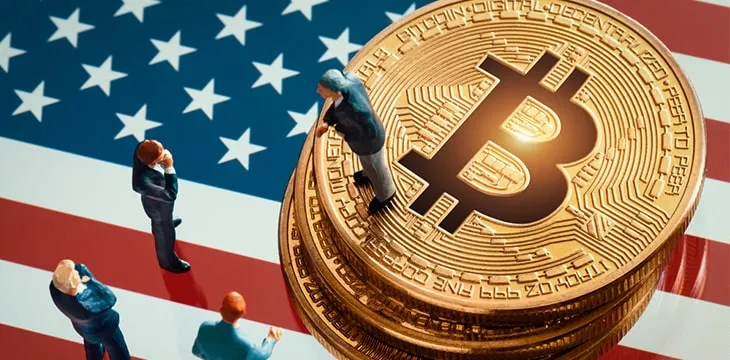|
Getting your Trinity Audio player ready...
|
A digital currency crackdown is coming—that’s the message that U.S. Securities and Exchange Commission Chairman Gary Gensler deliver throughout 2021. Additionally, the federal reserve board and several legislators weighed in on the blockchain, cryptocurrency and digital asset space. When it came to regulation in 2021, we saw government officials begin to set the stage for what looks like a new year that is full of digital currency law enforcement.
Gary Gensler has his eye on Crypto
In 2021, the U.S. securities regulator appointed a new chairman, Gary Gensler. Gensler is no stranger to distributed technologies. At the MIT Sloan business school, he taught classes on blockchain technology, digital currency, and fintech.
Gensler was nominated to chair the SEC by President Joseph R. Biden on February 3, 2021, and was confirmed by the U.S. Senate on April 14, 2021. Shortly afterward, he made his stance on digital currency clear to the world. Gensler believes that the digital currency industry needs more law enforcement and increased regulation.
Gensler uses hawkish language when talking about digital currencies, telling the public that he believes the industry has grown significantly and is entangled with the traditional financial system to the point where a negative event in crypto could have a ripple effect throughout the U.S. economy.
So before a catastrophic event even takes place in the industry and creates a financial shockwave, Gensler would like the SEC to step in and improve the investor and consumer protections, tax compliance, anti-money laundering, and financial stability around the emerging blockchain and digital asset markets.
Crypto companies increased their lobbying efforts
In anticipation of the law-making and law enforcement expected in the cryptocurrency industries, companies operating in these sectors ramped up their lobbying efforts. According to the Economist, digital currency firms spent $5 million in the first nine months of 2021 lobbying the United States Senate, a whopping 300% more than the amount spent in 2020.
Lawmakers prepared to make laws
Many congressional committees held hearings on blockchain, cryptocurrency and digital currency in 2021. The goal of these hearings was to better understand the blockchain and digital asset industry, what regulations already apply to it, and what areas of the industry need more regulatory frameworks or clarity.
These hearings served as a signal that lawmakers are gearing up to write, revise, and enforce blockchain and digital currency laws.
Lawmakers are generally interested in improving and enforcing regulations in three areas related to cryptocurrencies: tax reporting, determining if digital currencies are securities or commodities, and stablecoins.
The general takeaway from these hearings has been that lawmakers are very interested in making sure the technological innovation around the digital asset industry takes place within the United States, that they want to support the industry’s growth. Still, they want to make sure that the companies in these industries are lawful and compliant.
Regulators expressed concern over stablecoins
Both Gary Gensler and congressional committees expressed their concerns about stablecoins.
Many fear that stablecoins do not have 100% cash reserves, and therefore could bring the digital currency industry crashing down if there is a run on the bank of stablecoins. A majority of cryptocurrency trading activity takes place in stablecoins, and regulators believe this puts the entire industry at risk.
Why? Because if every stablecoin user tries to exit their stablecoin position simultaneously, the company providing the stablecoin will not have enough money to reimburse every user. This would reveal that stablecoin providers were not truthful about their cash reserves and that they are actually insolvent. When a big liquidity provider company is unable to pay its debts, it often has broader effects on the economy.
Stablecoins also pose a direct threat to the U.S. dollar. Not only are stablecoins a USD alternative, but on many cryptocurrency exchange platforms, individuals typically receive more interest for their stablecoin deposits than they do on the deposits of U.S. dollars in their bank accounts. Since that’s the case, wouldn’t it make sense to ditch your dollars and go all-in on stablecoins? Traditional financial institutions worry about the exodus from USD to stablecoins taking place.
Regulators want to see the digital currency ecosystem grow and thrive, but they do not want to see the world’s reserve currency—the U.S. dollar—lose its position in the process.
The wheels of justice turning slow
In 2021, we saw the SEC press charges against several ICO companies from 2017. In many instances, the SEC alleges that the company sold unregistered securities (coins and tokens) via their initial coin offerings.
These events are notable because they show how slow the wheels of justice turn; nearly five years have passed since many of these companies held their ICOs, and the SEC is just getting around to serving them papers.
The general takeaway from 2021
There was a lot of talk about cracking down on cryptocurrency in 2021 but not much action. Instead, government officials and legislators laid the groundwork for regulation and law enforcement to take place in the future.
The various government hearings and press conferences this year indicate that the blockchain and digital asset industry have grown so large, become so significant, and become so intertwined with the traditional financial system that regulators plan to scrutinize cryptocurrency enterprises the way they do traditional financial institutions.
Overall, the government and its legislators are not trying to throttle innovation around blockchain and digital currency. They want to guarantee that its participants are tax compliant, KYC and AML verified, and operating in a secure and stable ecosystem with protections for all players.
Watch: CoinGeek New York panel, Government & Public Sector Applications on Blockchain

 07-12-2025
07-12-2025 





